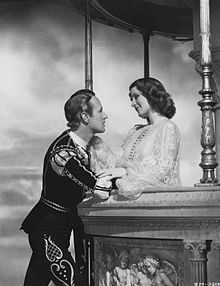Romeo and Juliet (1936)
| Movie | |
|---|---|
| German title | Romeo and Juliet |
| Original title | Romeo and Juliet |
| Country of production | United States |
| original language | English |
| Publishing year | 1936 |
| length | 125 minutes |
| Rod | |
| Director | George Cukor |
| script | Talbot Jennings |
| production |
Irving Thalberg for Metro-Goldwyn-Mayer |
| music | Herbert Stothart |
| camera | William H. Daniels |
| cut | Margaret Booth |
| occupation | |
| |
Romeo and Juliet is a 1936 American drama film directed by George Cukor, based on the play of the same name by William Shakespeare .
action
The Montagues and the Capulets, two influential families from Verona , hate each other. Romeo, son of the Montagues, runs into the Capulets and meets Juliet, the daughter of the Capulets. Both fall into passionate love. Since their families would condemn this, they secretly marry. Romeo gets into a fight with Tybalt, a nephew of Lady Capulet, and kills him. He is then banished from Verona. Lord Capulet, not knowing that his daughter is already married, has the plan to marry Juliet to Count Paris. This puts Juliet in a hopeless situation and she goes to the compassionate monk Laurence, who has married her to Romeo. He proposes a daring plan, but it ends with the death of the two lovers.
background
The film used the fantasy overture Romeo and Juliet by Pyotr Ilyich Tchaikovsky from 1869 as music .
Romeo and Juliet was the last film Irving Thalberg produced before his death. The premiere took place in the Carthay Circke Theater in Los Angeles on September 14, 1936, the day of Thalberg's death. Frank Whitbeck, who reported on the premiere of the film on the radio, decided not to interview any of the actors live. The actors were so grieved that Whitbeck feared they would break down in a crying fit, so only gave their names when they arrived.
The film's literary advisor was the English language professor, William Strunk, Jr. Thalberg enlisted Strunk to work with the scriptwriters to ensure that the script would be respectful of the literary source. Thalberg is said to have said to Strunk: "Your job is to protect Shakespeare from us" ("Your job is to protect Shakespeare from us").
The film contains the only film fencing match that the gifted fencer Basil Rathbone won in his entire acting career. Rathbone took on the role of Tybalt, although he had great success as Romeo on Broadway as Juliet in 1934 alongside Katharine Cornell . For the duel scenes, special non-slip felt shoes were designed for Howard, Barrymore and Rathbone. Research at the time showed that the felt soles were made from a resinous material from the Roman province of Scythia. Similar material was then produced by a pharmacist and the soles for the film scenes on the cobblestones in public places were treated with care.
A signed copy of the script, signed by 27 cast members including Rathbone, Howard and Shearer and staff members, was donated to the University of Idaho library in 1939 by screenwriter Jennings in 1939.
Casting and casting problems
The role of Romeo played by Leslie Howard should originally take over John Gielgud , who previously celebrated triumphs in a stage production in London with Laurence Olivier , with whom he alternately played the roles of Romeo and Mercutio. After him, the role of Romeo was rejected by Laurence Olivier, Fredric March , Robert Donat and Robert Montgomery . William Randolph Hearst tried to urge MGM to cast the role of Julia with Marion Davies , without being able to assert himself with Thalbert with his desire, who saw his wife Norma Shearer in the role from the beginning.
Some critics have argued that the then 43-year-old Howard and 34-year-old Norma Shearer could hardly play the young lovers of the Shakespeare play.
The role of Mercutio was the only full Shakespeare role that John Barrymore played in a film. Other appearances as a Shakespeare actor of his were in a test for a film adaptation of Hamlet , a monologue as Richard III. in the film The Show of Shows (1929) as well as a role as himself as an over-the-top Shakespeare actor in Playmates (1941).
The role as Julia's wet nurse was Edna May Oliver's only role in a Shakespeare film adaptation. In return, she declined the offer to take on her stage role as "Parthy Ann Hawks" in the film adaptation of Show Boat .
Theatrical release
Production costs escalated to 1,960,000 US dollars in the end, making Romeo and Juliet the most expensive MGM sound film to date. At the box office, the film proved to be reasonably successful. He grossed an amount of US $ 962,000 in the US, to which an additional US $ 1,113,000 came from foreign markets. With a cumulative total box office income of $ 2,075,000, the studio ended up with a heavy loss of $ 922,000.
Awards
The film went to the 1937 Academy Awards with four nominations , but won none of the awards:
- Best movie
- Best Actress - Norma Shearer
- best supporting actor - Basil Rathbone
- Best Production Design - Cedric Gibbons , Fredric Hope and Edwin B. Willis
Web links
- Romeo and Juliet in the Internet Movie Database (English)
- Romeo and Juliet at Turner Classic Movies (English)
- Background information and set photos
